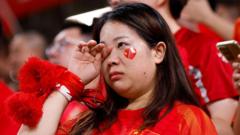Since President Xi Jinping took power in 2012, there have been ambitious aspirations for China to become a footballing powerhouse, with the government trying to reform the sport. However, structural issues have plagued these efforts, including a lack of grassroots engagement and political interference. The fallout from these systemic problems has led the national team into a period of embarrassment, with significant public dismay surrounding their failures.
With just 90th place in the FIFA rankings, the Chinese men's team appears far from the World Cup dreams envisaged a decade ago. The country’s women's team, however, continues to maintain a higher profile, indicating a complex sporting landscape. Fans are left grappling with the realities of their national team's performance, showing resilience in the face of ongoing disappointment.
The cultural implications of China's football struggles are profound. While individual sports have seen success due to concentrated investments, team sports like football lack the same organic growth and community involvement that breeds talent and nurtures consistent performance. China’s football narrative is a painful reminder of the need for foundational support to elevate the country to its hoped-for footballing destiny.
With just 90th place in the FIFA rankings, the Chinese men's team appears far from the World Cup dreams envisaged a decade ago. The country’s women's team, however, continues to maintain a higher profile, indicating a complex sporting landscape. Fans are left grappling with the realities of their national team's performance, showing resilience in the face of ongoing disappointment.
The cultural implications of China's football struggles are profound. While individual sports have seen success due to concentrated investments, team sports like football lack the same organic growth and community involvement that breeds talent and nurtures consistent performance. China’s football narrative is a painful reminder of the need for foundational support to elevate the country to its hoped-for footballing destiny.





















